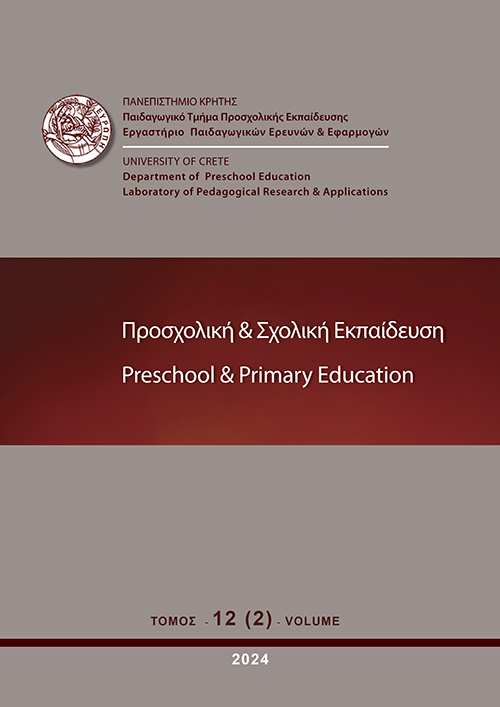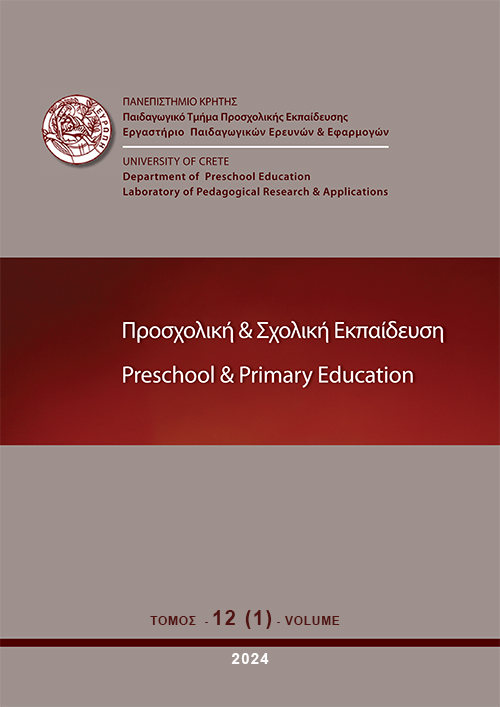Στάσεις, εμπόδια και προτάσεις νηπιαγωγών και γονέων της περιφέρειας Κρήτης για τη συνεργασία οικογένειας-σχολείου: Μια Μελέτη Επισκόπησης
Resumen
Στο παρόν άρθρο διερευνώνται οι στάσεις των νηπιαγωγών και των γονέων για τη μεταξύ τους συνεργασία, τα εμπόδια που δημιουργούνται μέσα από τις πραγματικές» συνθήκες της μεταξύ τους επικοινωνίας καθώς και οι ανάγκες τους όπως μπορούν να χαρτογραφηθούν από τις προτάσεις και των δύο πλευρών, για τη βελτίωση της συνεργασίας τους. Βασικός στόχος είναι να προταθούν λύσεις για τη βελτίωση της επικοινωνίας τους οι οποίες προκύπτουν μέσα από την πολυπλοκότητα των πραγματικών συνθηκών της σχολικής ζωής στις προσχολικές μονάδες και λαμβάνουν υπόψη την εκπαιδευτική πραγματικότητα, τις διαφορετικές συνθήκες που προκύπτουν κάθε φορά, αλλά και την αλληλεπίδραση παραγόντων που σχετίζονται με το σχολείο, την οικογένεια και τη μεταξύ τους σχέση. Για να ανταποκριθεί σε αυτά τα δεδομένα, ο μεθοδολογικός και θεωρητικός σχεδιασμός της παρούσας μελέτης, βασίστηκε σε θεωρητικά μοντέλα που ενδείκνυνται για τη μελέτη της πολυπλοκότητας των παραγόντων που συνδέονται με τη συνεργασία της οικογένειας με το σχολείο όπως το «οικοσυστημικό μοντέλο» που αναπτύχθηκε από τον Bronfenbrenner (1979) και το μοντέλο των «επικαλυπτόμενων σφαιρών επιρροής» της Epstein (1996). Με βάση τον θεωρητικό προβληματισμό σχεδιάσθηκε, εφαρμόστηκε και αξιολογήθηκε μία έρευνα επισκόπησης η οποία διενεργήθηκε κατά τη διάρκεια της σχολικής περιόδου 2022-2023. Τα βασικά εργαλεία συλλογής δεδομένων ήταν ερωτηματολόγια με ανοικτού και κλειστού τύπου ερωτήσεις καθώς και συνεντεύξεις τόσο σε γονείς όσο και σε εκπαιδευτικούς. Στην έρευνα συμμετείχαν 83 νηπιαγωγοί και 112 γονείς από προσχολικές μονάδες της Περιφέρειας της Κρήτης ενώ οι συμμετέχοντες επιλέχτηκαν βάσει δειγματοληψίας κατά συστάδες, ύστερα από τη χορήγηση άδειας από τη Διεύθυνση Πρωτοβάθμια Εκπαίδευσης Περιφέρειας Κρήτης και της Επιτροπής Ηθικής, Δεοντολογίας και Ερευνάς του Πανεπιστημίου Κρήτης. Στο παρόν άρθρο παρουσιάζεται ένα μικρό μέρος των αποτελεσμάτων όπως προέκυψαν από στατιστική ανάλυση κλειστών κυρίως ερωτήσεων των ερωτηματολόγιων γονέων και εκπαιδευτικών και προτείνονται κάποιες θεματικές για επιμορφωτικά σεμινάρια βάσει των αποτελεσμάτων.
Article Details
- Cómo citar
-
Δημητριάδης Δ., & Μανωλίτσης Γ. (2024). Στάσεις, εμπόδια και προτάσεις νηπιαγωγών και γονέων της περιφέρειας Κρήτης για τη συνεργασία οικογένειας-σχολείου: Μια Μελέτη Επισκόπησης. Preschool and Primary Education, 12(2), 149–178. https://doi.org/10.12681/ppej.35927
- Sección
- Άρθρα

Esta obra está bajo una licencia internacional Creative Commons Atribución-NoComercial-CompartirIgual 4.0.
Οι συγγραφείς των άρθρων που δημοσιεύονται στο ΠΡΟΣΧΟΛΙΚΗ & ΣΧΟΛΙΚΗ ΕΚΠΑΙΔΕΥΣΗ διατηρούν τα δικαιώματα πνευματικής ιδιοκτησίας επί των άρθρων τους, δίνοντας στο περιοδικό το δικαίωμα της πρώτης δημοσίευσης. Άρθρα που δημοσιεύονται στο ΠΡΟΣΧΟΛΙΚΗ & ΣΧΟΛΙΚΗ ΕΚΠΑΙΔΕΥΣΗ διατίθενται με άδεια Creative Commons 3.0 και σύμφωνα με την άδεια μπορούν να χρησιμοποιούνται ελεύθερα, με αναφορά στο/στη συγγραφέα και στην πρώτη δημοσίευση για μη κερδοσκοπικούς σκοπούς και με δικαίωμα τροποποίησης μόνον με παρόμοια διανομή (αν αναμείξετε, τροποποιήσετε, ή δημιουργήσετε πάνω στο υλικό, πρέπει να διανείμετε τις δικές σας συνεισφορές υπό την ίδια άδεια όπως και το πρωτότυπο). To Εργαστήριο Παιδαγωγικών Ερευνών και Εφαρμογών του Παιδαγωγικού Τμήματος Προσχολικής Εκπαίδευσης του Πανεπιστημίου Κρήτης και το Εθνικό Κέντρο Τεκμηρίωσης διατηρούν το δικαίωμα να δημοσιεύουν, να αναπαραγάγουν, να παρουσιάζουν στο κοινό, να διανέμουν και χρησιμοποιούν άρθρα που δημοσιεύονται στο ΠΡΟΣΧΟΛΙΚΗ & ΣΧΟΛΙΚΗ ΕΚΠΑΙΔΕΥΣΗ σε οποιοδήποτε μέσο και μορφή είτε μεμονωμένα είτε ως μέρη συλλογικών έργων, για όλο το χρόνο διάρκειας προστασίας της πνευματικής ιδιοκτησίας και για όλες τις χώρες του κόσμου. Αυτό περιλαμβάνει ενδεικτικά και όχι αποκλειστικά, το δικαίωμα δημοσίευσης των άρθρων σε τεύχη του περιοδικού ΠΡΟΣΧΟΛΙΚΗ & ΣΧΟΛΙΚΗ ΕΚΠΑΙΔΕΥΣΗ, αναπαραγωγής και διανομής μεμονωμένων αντιγράφων των άρθρων, αναπαραγωγής ολόκληρων των άρθρων σε άλλη έκδοση του Εργαστηρίου Παιδαγωγικών Ερευνών και Εφαρμογών του Παιδαγωγικού Τμήματος Προσχολικής Εκπαίδευσης του Πανεπιστημίου Κρήτης και του Εθνικού Κέντρου Τεκμηρίωσης και αναπαραγωγής και διανομής των άρθρων ή περίληψης αυτών με χρήση πληροφορικού συστήματος αποθετηρίου.




